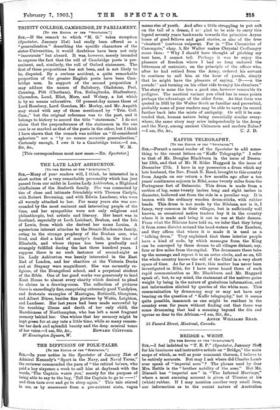KAFFIR TELEGRAPHY.
[To THE EDITOR OP THE " SPECTATOZ."1
SIR,—Permit a casual reader of the Spectator to add some- thing to the recent letters on "Kaffir Telegraphy." I refer to that of Mr. Douglas Blackburn in the issue of Decem. ber 13th, and that of Mr. H. Rider Haggard in the issue of December 27th. I have in my possession a drum which my late husband, the Rev. Frank N. Read, brought to this country from Angola on our return a few months ago after a ten years' continuous sojourn in Bihe, some twenty miles from the Portuguese fort of Belmont°. This drum is made from a section of log, some twenty inches long and eight inches in diameter, hollowed out from the side in a peculiar way. It is beaten with the ordinary wooden drum-sticks, with rubber heads. This drum is not made by the Biheans, nor is it, I fancy, very common in their villages, but is sufficiently well known, as occasional native traders buy it in the country where it is made and bring it out to use at their dances. From what the Biheaus have told us, we infer that they bring it from some district around the head-waters of the Zambesi, and they affirm that where it is made it is used as a "talking drum." They explained that these interior people have a kind of code, by which messages from the King can be conveyed by these drums to all villages distant, say, four or five miles from the capital. The drummers there take up the message and repeat it to an outer circle, and so on, till the whole country knows the will of the Chief in a very short space of time. As far as I know, this matter has never been investigated in Bihé, for I have never heard there of such rapid communication as Mr. Blackburn and Mr. Haggard speak of; but, to my mind, the statement of the natives gains weight by being in the nature of gratuitous information, and not information elicited by queries of the white man. This communication by drummmg may or may not have any bearing on the question of "Kaffir telegraphy," but it seems quite possible, inasmuch as one might be resident in the country even for years without finding out that there was some drumming that had a meaning beyond the din and uproar so dear to the African.—I am, Sir, &c.,
ANNIE WILLIAMS READ.
52 Favard Street, Montreal, Canada.










































 Previous page
Previous page